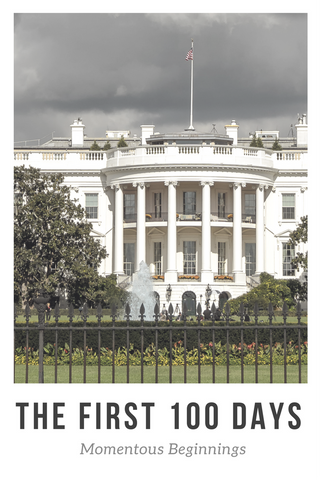Well, here we are in the first 100 days of the Trump Presidency! Hard to believe, isn't it? If you believe the media, Trump's is the first "out of the box" 100 days we've ever had to deal with. In reality, several presidents before him have served up some interesting months as they stepped into office.
Gerald Ford
Ford entered the Presidency in an extremely unique situation—named as VP after Spiro Agnew resigned, and then succeeded to Presidency when Nixon resigned on August 9, 1974. Ford was most remembered for pardoning the ex-president, starting the process to grant amnesty to draft dodgers of the Vietnam War, and toasting his own English muffin in the White House kitchen, trying to prove a point that he wasn’t a dictator or “imperial” President. Ford caused a nationwide outcry for pardoning Nixon after the scandals that followed him and pretty much doomed his chances of re-election in the 1976 election.
Jimmy Carter
Carter vowed to change Washington, brought in his own people, and came in guns a’blazing. Unfortunately, his first 100 days were not successful and in fact are reflected upon in a very negative light. He tried to change too much too soon, outside of the structure put into place. Granted, Carter came in at a tough time in our nation- major inflation, Cold War tension and ongoing energy crises, which would have put most anyone into a challenging situation.
Ronald Reagan
Reagan, our first “Celebrity President,” indeed also had daunting tasks before him when he took office, as did Ford and Carter, but his first 100 days were much more eventful. Though inflation and Cold-War were still at their height, immediate relief came in the hostage situation where Iran had taken Americans hostage as they released them the day Reagan was sworn-in. This was a feat in and of itself after they’d been held for over 13 months, but it’s not what he was most remembered for. On March 30, 1981, Reagan was shot in an attempted assassination, which he survived and thrived afterwards, only endearing the nation to him all the more as a fellow American. Unlike those he immediately followed into Presidential office, he took great care to keep relationships cordial and on good terms, even with those who opposed him, and built allies in Congress in such a way that neither Ford nor Carter could do. He also was more calculated in signing and passing bills and changes, signing his first bill on March 31, 1981, the day after he was shot.
George W. Bush
The second son of a President to ever take Presidential office (the first being John Quincy Adams in 1825), G.W. Bush is inaugurated as the 43rd President under unusual circumstances—leading up to his Inauguration Day, the 2000 election caused incredible controversy in the voting process, leading to recounts that focused primarily on South Florida counties, birthed the lexicon of the “chads” (hanging, dimpled, pregnant, tri, swinging door). Finally, in April 2001, USA Today and The Miami Herald released a full overview of the 2000 election showing that even if Gore had succeeded in getting the recounts, Bush still would’ve won by a very narrow 1,665 votes.
Barack Obama
In Obama’s first 100 days, he signed into motion the healthcare reforms that ultimately have tanked many major healthcare providers and has left millions of Americans unable to afford required healthcare through the Marketplace created, though at the time this was touted as a tremendous achievement: “affordable healthcare for all”!
Abraham Lincoln
Going back in time to one of America’s most-beloved forefathers, Lincoln stepped into office at an incredibly tense time- the country was on the brink of a war with states threatening to secede, and the nation was divided when it came to slavery. Lincoln did all he could to peaceably negotiate with Confederate states, but alas, ultimately had no choice but to go to Civil War in his first 100 days, when shots were fired by Confederates at Fort Sumter on April 12, 1861.
Order delicious coffee now!


